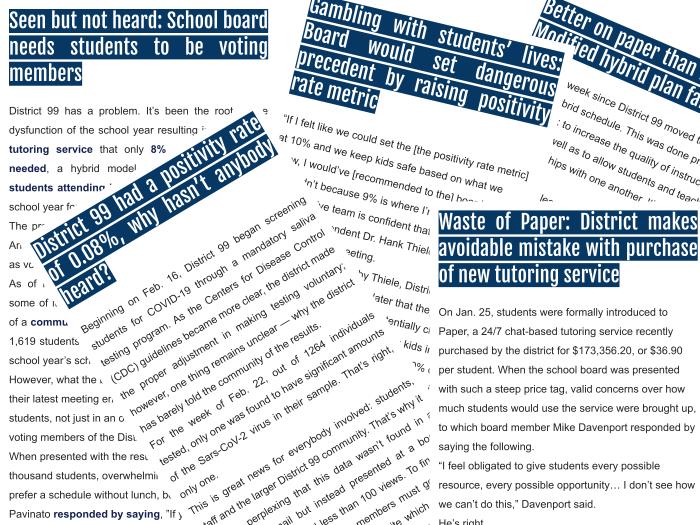A crash course in writing editorials to make the district better

More stories from Luc Alvarez
Over the course of writing a half-dozen or so editorials, I’ve learned some lessons worth sharing.
This past year — at least in my head — I’ve been probably the biggest nuisance to the District 99 administration among the student body. Beginning with critiques on the district’s hybrid plan and ending with a call for the school board to give student members voting power, I wrote a lot about District 99 with none being particularly positive.
For the record, I’m very thankful for the opportunities DGS has given me and where it’s gotten me. That’s exactly why I wrote these editorials: to make a school I cared about better for its students.
However, the work isn’t done and I know that there’s some future journalists reading this hoping to make the same impact that I hope my articles had. So here’s a guide to being a hard-hitting journalist.
Finding the story
The most important part of any good editorial is in the ideation of it. There’s no story without controversy and finding it is your first step in writing a good one.
For this, listen to what may seem like petty complaints from classmates. What’s often brushed off as simple annoyances can actually be real issues that deserve to be called out. Staying informed on what’s happening in your school and what the student body feels about it is integral to being a good journalist.
Your goal as an editorial writer should be to make an impact that will improve your school and community. There’s a lot of different areas that could benefit from some improvements — find them.
Getting background
Once you’ve identified what’s going wrong in your school, you need to find background information. This will not only help your credibility in the long-run, but also help develop your argument.
The main source of information for District 99 is on boarddocs.com. Here, you’ll find everything presented to the board, from contracts, to future plans, to lawsuits, oftentimes before they get announced at board meetings. A lot of times the district-wide emails leave out how many zeroes are in some contracts, so going straight to the source is your best bet for finding a story.
To see the actual board meetings, at least for this year, you can go to District 99’s YouTube channel where they post full length recordings of board meetings. To save some time, use the agendas found on boarddocs.com to try and skip around and only see the important stuff.
Everybody will have their own impression of the board members but the most important thing to keep in mind is your job to hold them accountable. Whether that means calling out hypocrisy, revealing flaws they might not have seen or providing a likely overlooked student perspective, it’s your job to write what you feel will make your school community better.
If you still need more, talking to those in the know is another good route for gathering info. While school administrators are usually hush-hush, if you play teacher’s pet develop relationships with teachers for long enough, you can usually get some off-the-record insight that will help you know what leads to chase.
Of course, the best interviews are on the record where you can include them directly in your article, but in my experience this isn’t always possible when things are even remotely controversial. Turns out employees generally don’t want to speak ill of their employer — fair enough I guess.
Writing the story
This is the hard part. Actually converting your likely frustration into a coherent and concise article can be a challenge. I’m by no means some godly writer that has everything figured out, but here’s some tips I have after writing a half dozen of these.
Catching those in power in a lie or contradiction with a direct quote works incredibly well. Along with this is exposing financial waste that many don’t realize is going on — of course be sure to include the direct sources in your articles so readers can see for themselves.
You should be careful to balance emotion with content and not write them out of some sort of vendetta against the school. Your job is to make it a better place with legitimate critiques, not tear it down in the name of self-righteous journalism.
The best advice though, is to read other editorials, write your own and get lots of feedback from lots of people. Hypothetically, this could be another Editor-in-Chief that helps you at every step in the writing process. Hypothetically, of course.
Getting the word out
There’s lots of ways to promote your articles. The easiest and most common is to promote them on your personal social media and the DGS Blueprint’s social media. Depending on how controversial the topic, you’ll usually end up with a few hundred views.
To really get the word out, get others to promote your work, either wittingly or unwittingly. For example, a bold teacher promoting what could be seen as an anti-administration article can get you a few hundred views. Having a parent repost it in a Facebook group — even if they disagree — can get a few thousand.
In the end though, there’s really only a few people that need to see your work for you to do your job right. While I never did it, you could email them the article directly. Having someone else do it on your behalf will probably get a better reception though.
Final advice
A lot of writers when they first get into editorials are afraid of starting controversy and being too harsh, whereas others take the opposite approach and sacrifice content for firestarting. Finding a balance between the two is key.
There’s also a common belief among student journalists that what you do doesn’t matter. While there may be some stories that aren’t as groundbreaking as what you see on the front page of major newspapers, student journalists have an important role in holding schools and their administrators accountable. Student journalists are the ones on the ground that know the truth, and if you’re willing, the ones that speak it.
So to any future journalist reading this, find the truth and speak it — your classmates are counting on you.

